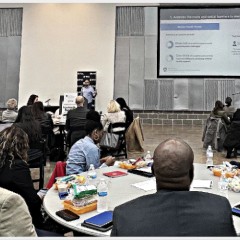Last week, educators, administrators and experts in Houston’s affordable housing landscape joined the consortium’s discussion “Switching Schools: Student Mobility Across the Houston Region,” part of its Education Research Engagement Series sponsored by PNC.
“Any disruption to a student’s education — even a week — has consequences,” Associate Director of Regional Research Lizzy Cashiola told the attendees. “Continuity of instruction is critical for all grade levels.”
Houston-area students who move schools during the summer are more likely to stay within their original school district and face less disruption. Mobility during the school year is more disruptive because it often leads to students being introduced to a new district. For elementary and middle school students, this often results in an immediate drop in standardized test scores and continued struggles as they advance grade levels. For high schoolers, mobility can result in an increased likelihood of repeating the ninth grade, not graduating on time or dropping out.
In addition, students who change schools are likely to make multiple moves, compounding the effects on academic performance. HERC found that students from historically underserved communities were more likely to move.
“Part of going to a new school in the middle of the school year is that there are going to be some social and emotional needs that need to be met during that transition,” Cashiola said. “Academically, if they were a part of a special program or received special education services, what is the disruption for those services to start again at the new school? It’s a combination of many different factors.”
Students may switch schools for academic opportunities, convenience, familiarity or other reasons. However, Cashiola said the most common reason is a change in residence — and the cost of housing may often be a factor.
According to the Kinder Institute’s 2023 State of Housing in Harris County and Houston report, 58% of Houston households and 45% of Harris County households are renters. When factoring in how much households spend on rent in addition to other costs such as child care and health care, 73% of two-parent households and 88% of single-parent households in Harris County are considered cost-burdened. In addition, a recent Kinder Institute survey found 38% of Houston residents — and 51% of renters — worry about paying for housing. Almost 30% of renters reported being worried about eviction.
In a question-and-answer session, educators and researchers discussed the need for schools to be included in conversations about housing affordability.
“While the Student Mobility study occurred before the COVID-19 pandemic, we know that housing affordability has only gotten worse and evictions have increased, particularly for families,” Cashiola said. “We anticipate this to continue to be a challenge that the Houston community will need to address.”
To provide a smoother transition for students who change schools, attendees suggested the creation of mobility offices within school districts and increased communication between districts.
“School districts need to communicate with each other and have some ability to transfer information,” Cashiola said. “Moving districts is a lot more disruptive than moving schools within a district because information does not always go along with the student in a timely manner. It would also be helpful if the state had an information system where information was transferred more easily across districts.”
The newly created Texas Education Exchange, which connects districts and charter schools from across the state, could help close some of the gaps. The exchange was founded by five of the state’s education service centers — Region 4 in Houston, Region 10 in Dallas, Region 11 in Fort Worth, Region 13 in Austin and Region 20 in San Antonio — and hopes to expand to include all 20.

